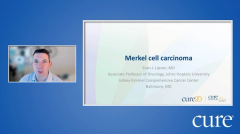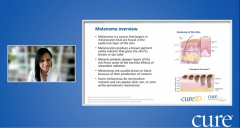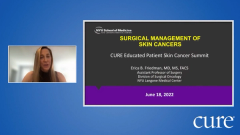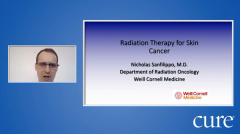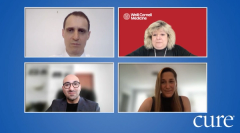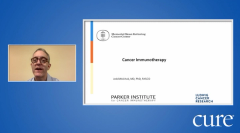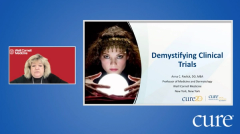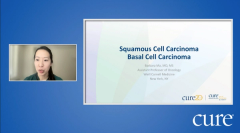
Educated Patient® Skin Cancer Summit The Basics Panel: June 18, 2022
Watch Dr. Barbara Ma, Dr. Evan Lipson, Dr. Sunandana Chandra and Samantha Guild answer questions on the basics of skin cancer and melanoma during the CURE Educated Patient Skin Cancer Summit.
This panel was moderated by Dr. Anna C. Pavlick and featured Dr. Barbara Ma, Dr. Evan Lipson, Dr. Sunandana Chandra and Samantha Guild, from AIM at Melanoma.
Pavlick: Does melanoma metastasize to the breast, Dr. Chandra?
Chandra: That's a great question. In fact, it can metastasize to the breast. And, because we obviously don't want to assume that it's melanoma, we may often recommend a biopsy just to make sure that it's not a breast cancer. But yes, to answer that question, it can metastasize to the breast. It can literally metastasize to anywhere in the body.
Pavlick: Thank you. And we have a question for Sam. Can you discuss resources available for patients and their caregivers at Aim at Melanoma?
Guild: Thank you, Dr. Pavlik. So first, we have (resources for) melanoma. But I do want to mention that we have a second resource for BCC/SCC patients (with) the Skin Cancer Education Research Foundation, and that can be found at skincancerinfo.org. Both of the websites have an array of resources available for the skin cancer community.
We have the Ask an Expert (program) where people can ask a physician assistant questions about staging, treatment options, some of the basic questions. We have a peer-to-peer program to help where we match veterans with newly diagnosed patients. (We also have) educational events. You know, there's such a change, this landscape is changing so quickly. Every day, you know, we're hearing about new things that are happening. And so we have websites where patients can come and learn about some of the new things that are happening.
And we discuss not only prevention and early detection, but staging, treatment options, just you know, breaking news, clinical trials. … So all of that is being discussed, helping patients manage the side effects of treatments. And so those are some of the things that we offer to help support patients throughout this journey.
Pavlick: Thanks, Sam. We have another question. I guess this can go to the panel. Is high-dose alpha interferon no longer used in the treatment of melanoma?
Lipson: That is correct. In the United States, that is correct. Interferon is still used in other parts of the world in some cases, but that too, is falling out of favor.
Pavlick: Dr. Lipson, is the recurrence of Merkel cell carcinoma normally in the first three-year window?
Lipson: Like many skin cancers, the risk for recurrence is higher the closer you are to the surgical removal of the cancer. So in the first six months, 12 months, 18 months after surgery, the risk that the Merkel cell or melanoma or anything else is going to come back is higher than it is if you're three, four, five, six years out.
Pavlick: Thank you. There's another question and this will go to Dr. Ma. Can you comment on the use of topical 5 FU versus blue light photo therapy for individuals who have multiple basal cell skin cancers?
Ma: So topical treatments, such as 5 FU, they are often used for not only SCCs but also BCCs but also for precursor lesions such as those called actinic keratosis. So these are usually more for like superficial lesions and really is to try to prevent it progressing to a later form. So for example, preventing AKs from becoming SCCs. So photodynamic treatment is another light therapy that is more used. But these are more attending to the like the more local treatments that our dermatology colleagues are also using.
Pavlick: Thank you. This is a question, I'm assuming this is coming from a patient who has or had melanoma. The question is, are any of my family members at risk for skin cancer and what should I tell them to do? And I can just open that up to the whole panel.
Chandra: So the likelihood of melanoma being an inheritable condition is actually fairly rare. But we can certainly see it, you know, clustering families, without there being an inheritable genetic predisposition that we found. And that may just be because of, you know, environmental factors. For example, if we're a family, we may always, you know, vacation together, we may have the same environmental exposures. And so that kind of puts all of us at the same risk. In general, I do tell my patients that, you know, having a good dermatologic evaluation for everybody is not a bad idea. And then, in fact, I would recommend it and then a dermatologist can look at one's skin and kind of determine their risk of developing skin cancers. And they might then give some specific directions as to how often they should be seen.
Pavlick: Thanks. We have another question for Dr. Lipson. What can the AMERK test determine in a Merkel cell patient?
Lipson: Great question. The AMERK test is a test of the body's production of antibodies against a certain piece of the Merkel cell. What that means is that sometimes in patients, when the body sees the Merkel cell cancer growing, it starts producing a molecule that is detectable in the bloodstream. Some patients do produce this molecule, some patients do not, about 50/50. In patients that do produce that molecule, and you can test (to) find it in the bloodstream. The level of the molecule is important and understanding what the Merkel cell cancer is or is not doing. And if that level goes up, that typically means that the Merkel cells growing somewhere in the body, that level goes down or stabilizes, then the opposite is true. Generally, things are quiet.
So the question is where is that helpful? Why is that helpful? Well, in some cases where we're no longer doing repeat CT scans, or PET scans, or looking inside somebody's bodies with some sort of X-RAY, you can use that blood test as sort of an indicator that the Merkel cell is quiet or not, instead of doing the scans that that oftentimes accompany the surveillance for those patients. For me, that's most useful time to do it. Some clinicians use it in other scenarios as additional information when you're getting at the time of a scan. But just broadly, it is a blood marker of the activity of Merkel cell carcinoma, that is applicable in about half of patients.
Pavlick: Thank you, Dr. Lipson. A patient says, “I have a history of basal cell and squamous cell carcinoma on my scalp and face that have been excised by Mohs surgery. Am I at a greater risk for developing melanoma.” And again, we can just open that up to the group.
Ma: Not all, you're at greater risk of any skin cancer. If you have a prior history of skin cancer, I would say with the history of the SCC and BCC, depending on the size and maybe a higher risk for a local recurrence. But in general, the risk factors are like sun exposure. The most important thing is going to be frequent surveillance. So that would be with your dermatologist, as well as daily sunscreen use. And those would be the main things to try to prevent risk of other skin cancers or for it coming back again.
Pavlick: And just to briefly comment about the question regarding family members in melanoma, I think it is important just to remember that most families have the same type of skin tone. Many families who have strawberry blond hair, blue eyes and freckles, there's a number of those patients who will have that same family characteristic. And so you've got to make sure your family members practice all the safe sun techniques to make sure that they don't develop a melanoma or other skin cancer as well.
Sam are their resources to help patients find an expert for their type of skin cancer?
Guild: Thank you. So finding an expert who specializes in your disease, whether it's melanoma, breast cancer, etc, is always really important. Finding that expert can make sure that you are learning about the latest and greatest treatments that are available out there. And so it's something we certainly encourage. Both of our websites have those resources available. Many of the major cancer centers do it. If you are not near a major cancer center, I would certainly reach out to many of the centers if they know somebody who is in your community. Travel is very hard. There's the issue of financial toxicity.
So starting with an organization like ours that has that is a great idea or reach out to your oncologist and ask them you know, who do you know and in their area that you can go to, to get a second opinion. Just because you're going to someplace that has an expert doesn't mean you have to stay there, you can go to one of these experts, find out the information that you need to know and then go back to your oncologist. And so they can work together to make sure that you're receiving all the information necessary.
Pavlick: I think that's an excellent point. I know many of us are very happy to work with local oncologists in treating patients together. Because coming to big academic centers can sometimes be very cumbersome, difficult and financially difficult for patients. And I know all of us, at least on the screen here are more than happy to collaborate with local doctors. There is another question from a participant that says, “What are the proper questions I should ask to make sure I'm seeing the right doctor for my skin cancer.”
Guild: So again, I think starting with those websites like ours that have resources to find out who the specialists are, is one way. We also provide questions on our website for each stage. So on the skincancerinfo.org website, we even provide questions about Mohs surgery. Um, so that is one place to start, you know, reading the information, you know, going to resources like ours that have an asking experts, and then having a discussion.
There are no wrong questions. And one of the other things I'm going to suggest is, you know, before you go and speak with the specialists, write down some questions that are important to you. I mean, we're just providing suggestions. But you might have questions that are specific to your care, and there is certainly no reason not to ask them. And then, if possible, I know COVID has made it difficult. But if you can bring somebody with you to help ask questions, they may have some other ideas of things that are important to know. And then they can also help write those questions down.
Pavlick: Okay, and we have another question. And again, this will be to the group, how often should I get checked for skin cancer after I've had treatment for my skin cancer? So I think we can kind of go through each of the diseases. We can start with Dr. Ma, then go to Dr. Chandra, and then Dr. Lipson.
Ma: Yeah, so for BCCs/SCCs, if you've been treated by surgical excision or radiation, usually it's going to be skin checks with dermatologists and also with your surgeon, but usually, you would try to do it on the every three to six months interval.
Chandra: Similar to that in melanoma, depending on the stage. So, for a little bit more advanced stage, we generally recommend, especially after post-surgical therapy or adjuvant therapy, depending on your doctor, they may ask to see you every three to six months, for the first few years.
For our patients who have more advanced, or stage 4 melanoma, depending on their treatment regimen, we would see them probably much, much more frequently. And because as we're treating them, we want to make sure that they're tolerating treatment, and so that might be on a much more frequent basis.
And then, for stage 1 and stage 2 melanoma, depending on your doctors, you may be seeing your dermatologist, your surgeon, possibly a medical oncologist, especially for stage 2, and then depending on the risks, and depending on whether you got adjuvant or post-surgical therapy, they may see you every three to six months as well.
It really depends on your stage. If you're getting treatment, what point in the course you are, whether you're in the first, you know, two, three, four, give years versus maybe 10 years out, and then that will kind of determine how often that they may recommend to see you. But it's pretty frequent. And that's just for the person's safety. I mean, the sooner we catch it, if it does come back, usually the better the outcomes.
Lipson: I think I would echo that for Merkel cell, it has to do a lot with stage, it has to do a lot with timing and how far out someone is from diagnosis. I would say generally for the higher risk folks, we encourage patients to see medical oncologists a couple a few times a year, and to check in with dermatology probably once a quarter, once every four months. I think as the risk decreases over time, those visits get stretched out from every three or four months to every six months or so. But I would say that, in general, for folks that are at high risk for any sort of skin cancer, we typically encourage them to, at the very least, have regular dermatologic evaluations at least a couple of times a year.
Guild: So as a patient advocate, I want to encourage individuals to do self-checks every month. So we all heard about the guidance that's given for patients who are in active treatment or beyond treatment, but really a lot of skin cancers have been found by patients through their own self skin exams. And there are many organizations that show examples of how to do the skin exams, you do it yourself or with a partner. If you find something that you think is suspicious, one of the things that I recommend is that you take a picture of it with your camera, and then follow it along so that you can compare it with other photos. And then again, if you see something suspicious, you need to go to a provider before your next scheduled appointment.
Pavlick: There's another question about stereotactic radiation. Is that an effective treatment for basal cell carcinoma?
Ma: When we're talking about stereotactic radiation, like SRS, it's usually more when we're talking about radiation in the basal cell setting, you meet with the radiation oncologist. And it's usually in the setting for let's say they had a basal cell that was resected. But the margins were where they removed it (there was) still some left or it's in a place where they had just recovered. That's actually when radiation is used to treat. So that's usually more like an individualized plan that's in discussion with the radiation oncologist. So I'm assuming that when they say is radiation an option that's what they're referring to.
Pavlick: I'm assuming the same, yes.
So we're coming to the end of our Q&A session. We've got one more question that I think is really important for us to discuss. And the question reads, “I am a Native American and have darker skin tone. I grew up in an era where sunscreen was not used until I reached my teens. Are Native Americans more at risk for certain types of skin cancer?
I think just to put that in a big overview, I think we need to just discuss how skin cancers can occur in dark-skinned individuals. So I think let's put that out there to the to the panel.
Lipson: Yeah, I would say the same. We do often think of darker-skinned individuals as not having the same risk profile in terms of skin cancer. In some cases, that's true, for reasons that Dr. Chandra described. But as Dr. Pavlik said, is absolutely the case that patients with darker skin do in fact get skin cancer. And so, I think the same rules apply in terms of self-exams, and, as Sam Guild said, bringing anything that looks suspicious to the attention of your dermatologist.
Transcription edited for clarity.
For more news on cancer updates, research and education, don’t forget to

